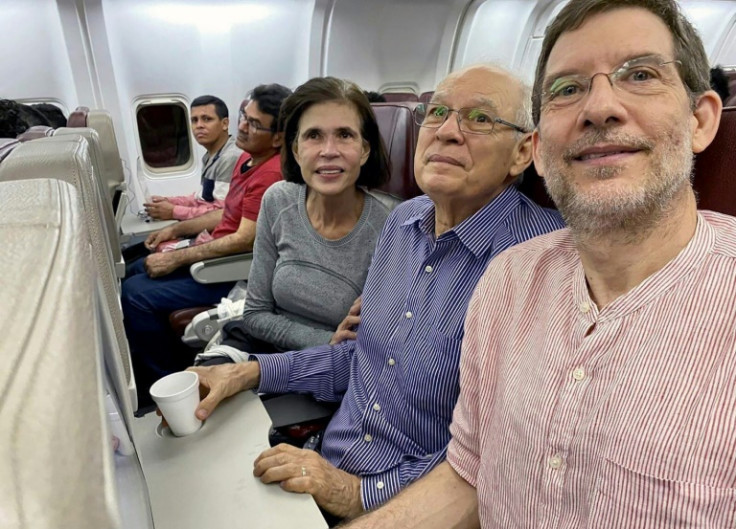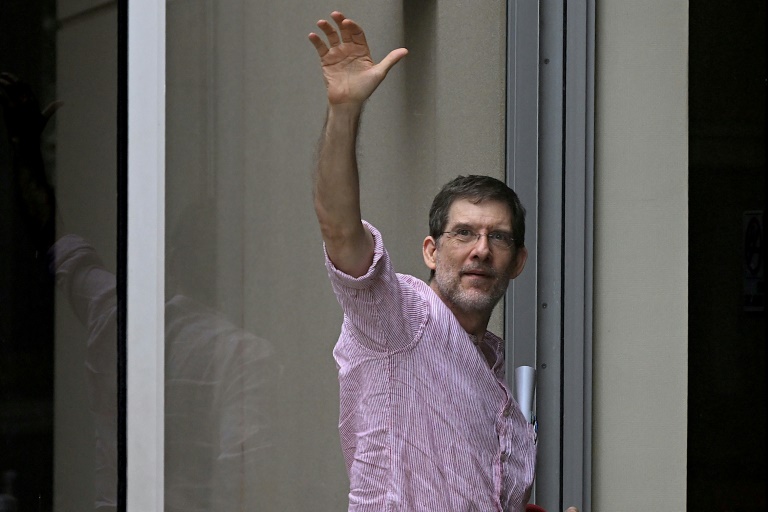AFP
It seemed like just another grim day in his solitary prison cell for Juan Lorenzo Holmann Chamorro, whose family owns Nicaragua’s oldest newspaper, but by evening he knew something was brewing.
In a matter of hours, he and 221 other Nicaraguan dissidents would be on a US-bound plane to freedom, where they arrived Thursday.
“We were getting ready to sleep when they came to our cells and told us, ‘Take off your uniforms and put on these civilian clothes,'” Holmann told AFP.
Holmann, 56, had been in the dreaded El Chipote prison since August 14, 2021, when police raided La Prensa, the nearly century-old newspaper owned by his family and where he served as general manager.
“They took us to an area of larger cells and put 12 of us in each one,” Holmann recounted. “We were happy to see one another, to hug and to chat” because in the prison they were all separated and it “was prohibited for us to speak to people in other cells.”
That was only one of the rigid rules of confinement. Others included a ban on reading material, even The Bible.
Last December, with some of the dissidents ailing, guards grew a little more relaxed and allowed visits from family members once every two weeks, he said.
Then the fateful night arrived.
“I don’t know what time it was. You didn’t know in those cells… Finally they took us to some buses,” he said.
It was then that he caught sight of his first cousins: Cristiana Chamorro, a former presidential candidate; and her brother Pedro Joaquin Chamorro, a former Cabinet minister. They were in another bus.
“They didn’t let us talk on the bus. There was a hooded policeman with a balaclava,” he said.
“In my mind, I thought there were two options: Either they were taking us to the courts to hand down a sentence or transferring us to the Modelo prison. When we passed the courts, it occurred to me that there was a third option. The highway leads to Modelo but also to the airport.”
The third option was correct.
“God has heard us and we are going to the airport,” Holmann thought to himself.
“An official got aboard the bus with a manila envelope and said, ‘You are being deported. I will give you a sheet that you must sign accepting the conditions,'” Holmann said.
The sheet read: “I accept being sent to the United States, complying with legal requirements.”
That’s when the dissidents knew they were headed to exile. And they would soon learn that the government of President Daniel Ortega, with a rubber-stamp vote in the National Assembly, had sought to take away their Nicaraguan citizenship, an act that Holmann said “is prohibited in our constitution.”
“There were people from the State Department giving us a new passport” from Nicaragua to each freed prisoner.
Holmann’s new passport, which was seen by AFP, says that he is a Nicaraguan citizen and that it does not expire until February 2033.
Holmann flew with the other 221 dissidents to Dulles Airport west of Washington, where the US government provided medical and legal services and a migratory status allowing each one a minimum of two years on US soil.
One of his daughters came to greet him. But his wife still is in Nicaragua, and he hopes she can join him in exile.
“We Nicaraguans must find common ground to re-establish democracy and create a new republic,” he said.
Holmann carries on his shoulders the grand history of La Prensa, which the right-wing dictator Anastasio Somoza sought to shut down in the 1950s, and the leftist Sandinista Front tried to muzzle in the 1980s.
“Now, Daniel Ortega comes along and confiscates… the newspaper installations. But he couldn’t silence La Prensa. No one can do that, certainly not them.”
“We are in our 97th year of tireless struggle for freedom of expression, to be the beacon of opinion of Nicaraguans, to be the voice of the voiceless,” Holmann said.
During his 18 months in prison, Holmann lost 40 pounds (18 kilos). One of the first things he plans to do is to go to church “to give thanks to God” because “He has saved our faith.”
He’ll see life through other eyes.
“When I was inside (the prison), I learned the real value of freedom of expression and even if it sounds cliche I will value more the love of my family, the brightness of the sun (and) the air.”

AFP







